
INTERNATIONAL JOURNAL OF DAIRY TECHNOLOGY
Scope & Guideline
Empowering the dairy industry with cutting-edge research.
Introduction
Aims and Scopes
- Dairy Product Safety and Quality:
Research on the microbiological and chemical safety of dairy products, including studies on contaminants such as aflatoxins and antibiotic residues. - Innovative Processing Technologies:
Exploration of novel processing techniques such as ultrafiltration, high-intensity ultrasound, and enzyme applications to enhance dairy product quality and functionality. - Nutritional and Functional Properties of Dairy Products:
Studies focusing on the nutritional benefits and bioactive compounds in dairy products, including the health implications of various dairy ingredients. - Microbial and Enzymatic Dynamics:
Investigations into the role of microbial communities and enzymes in dairy fermentation processes, including the development of probiotics and their health effects. - Dairy Ingredients and Formulations:
Research surrounding the formulation and characterization of dairy products, including the optimization of milk protein isolates, emulsifiers, and stabilizers.
Trending and Emerging
- Health Benefits of Dairy Products:
An increasing number of studies are focusing on the health benefits associated with dairy consumption, including research on bioactive peptides and probiotics that offer potential therapeutic effects. - Sustainability in Dairy Production:
Research on sustainable practices and waste valorization in dairy production is gaining traction, reflecting global concerns about environmental impact and resource efficiency. - Advanced Analytical Techniques:
Emerging methodologies such as metabolomics, proteomics, and machine learning applications for dairy analysis are becoming more prevalent, showcasing the integration of technology in dairy research. - Functional Dairy Products:
There is a growing trend towards the development of functional dairy products, incorporating ingredients that promote health and wellness, such as omega-3 fatty acids and plant-based additives. - Cross-Disciplinary Approaches:
Increased collaborations between dairy science and fields such as food technology, nutrition, and microbiology indicate a trend towards holistic approaches to dairy research.
Declining or Waning
- Traditional Dairy Processing Techniques:
Research focused on conventional dairy processing methods has decreased, possibly due to the rise of innovative technologies that promise higher efficiency and better product quality. - Basic Chemical Analysis of Dairy Products:
There is a noticeable decline in studies that solely focus on basic chemical composition analyses as more complex, multifaceted studies that incorporate advanced analytical techniques gain prominence. - Consumer Acceptance Studies:
While consumer studies remain important, there has been a shift towards more technical and scientific investigations, leading to fewer publications dedicated solely to consumer acceptance of dairy products.
Similar Journals
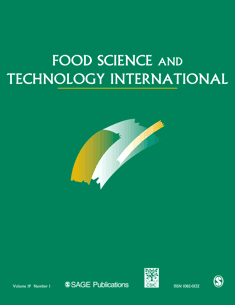
FOOD SCIENCE AND TECHNOLOGY INTERNATIONAL
Advancing innovation in food science and technology.FOOD SCIENCE AND TECHNOLOGY INTERNATIONAL, published by SAGE Publications Ltd, is a premier journal in the fields of food science and technology, serving as a crucial platform for the dissemination of innovative research and practical applications from 1995 through to 2024. With an impact factor reflecting its significant standing—ranking in the Q2 quartile for Chemical Engineering, Food Science, and Industrial and Manufacturing Engineering—this journal plays an instrumental role in advancing the interdisciplinary study of food systems. Researchers, professionals, and students can access high-quality contributions that address the latest developments and trends in food technology, safety, and processing. Located in the United States, FOOD SCIENCE AND TECHNOLOGY INTERNATIONAL also boasts commendable Scopus rankings, ensuring its articles are both relevant and widely cited within the academic community. As a vital resource for anyone engaged in food science research, этот журнал fosters knowledge sharing and innovation in the ever-evolving landscape of food technology.
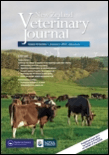
NEW ZEALAND VETERINARY JOURNAL
Advancing animal health through rigorous research.NEW ZEALAND VETERINARY JOURNAL, published by Taylor & Francis Ltd, stands as a pivotal platform in the realm of veterinary science, contributing significantly to the global discourse on animal health and welfare since its inception in 1952. With an ISSN of 0048-0169 and an E-ISSN of 1176-0710, this journal offers invaluable insights within both the veterinary and general medical fields, currently achieving a commendable Q2 ranking in Veterinary (miscellaneous) and Q3 in Medicine (miscellaneous) for 2023. Its Scopus ranking places it in the 76th percentile among veterinary journals, affirming its high-impact presence in academia. While access to this journal is not open, it maintains an essential role for researchers, professionals, and students aiming to advance their knowledge and contribute to the field of veterinary science. With a commitment to disseminating quality research, NEW ZEALAND VETERINARY JOURNAL enriches the understanding of veterinary practices and enhances ongoing dialogue on critical health issues affecting animals, promoting better outcomes through scientific inquiry.
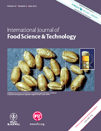
INTERNATIONAL JOURNAL OF FOOD SCIENCE AND TECHNOLOGY
Advancing the Future of Food Science and TechnologyINTERNATIONAL JOURNAL OF FOOD SCIENCE AND TECHNOLOGY, published by WILEY, serves as a premier platform for the dissemination of cutting-edge research in the field of food science and technology. With an ISSN of 0950-5423 and E-ISSN 1365-2621, this journal has been committed to publishing high-quality research since 1966 and is set to continue its impactful contributions through 2024. Recognized for its excellence, it holds a Q1 ranking in Food Science and a Q2 ranking in Industrial and Manufacturing Engineering as of 2023. The journal ranks #95/384 in Industrial and Manufacturing Engineering and #100/389 in Food Science on Scopus, placing it within the top quartiles of these fields. Although it does not currently offer Open Access, researchers and professionals benefit from access to a wealth of knowledge that advances understanding in both applied and theoretical aspects of food science. This journal is indispensable for anyone in the academic and professional domains who seeks to stay abreast of innovations and trends shaping the food industry.

INDIAN JOURNAL OF DAIRY SCIENCE
Pioneering Knowledge in Dairy Science and TechnologyINDIAN JOURNAL OF DAIRY SCIENCE, published by the INDIAN DAIRY ASSOCIATION, is a premier journal dedicated to the dissemination of cutting-edge research in the field of dairy science. With a notable ISSN of 0019-5146 and an E-ISSN of 2454-2172, this journal serves as a vital resource for researchers, professionals, and students aiming to deepen their understanding of dairy science and technology. While the journal currently does not offer open access, it provides a comprehensive platform for significant scientific advancements related to dairy production, processing, nutrition, and management, among other crucial topics. Recognizing the importance of dairy in food security and economic development, the INDIAN JOURNAL OF DAIRY SCIENCE encourages innovative research and discussions that address current challenges in the industry. By fostering collaboration among scientists and practitioners, it plays a crucial role in enhancing dairy practices and policies in India and beyond.

Food Production Processing and Nutrition
Empowering scholars with breakthrough findings in food science.Food Production Processing and Nutrition, published by SpringerNature, stands at the forefront of advancing knowledge in the vibrant fields of food science, nutrition, and public health. This esteemed Open Access journal, operational since 2019, plays a pivotal role in disseminating breakthrough research that intersects food production processes with nutritional insights, making it an invaluable resource for researchers, professionals, and students alike. With a commendable 2023 impact factor reflecting its robust scholarly contributions — Q1 in Food Science and Q2 in both Nutrition and Dietetics and Public Health, Environmental and Occupational Health — the journal not only emphasizes the importance of innovative food processing methods but also addresses pressing nutritional challenges faced globally. Located in the United Kingdom, it claims an impressive Scopus ranking, with a notable percentile standing across various categorical metrics. As such, Food Production Processing and Nutrition is essential for anyone aiming to deepen their understanding of how food systems impact public health through effective processing and nutritional strategies.

International Food Research Journal
Bridging Disciplines in the World of Food ResearchThe International Food Research Journal, published by UNIV PUTRA MALAYSIA PRESS, serves as a pivotal platform for disseminating innovative research within the field of food science. With an ISSN of 1985-4668 and an E-ISSN of 2231-7546, the journal has successfully established its presence since its inception in 2007, converging its findings through 2024. This esteemed journal holds a Q3 ranking in Food Science, illustrating its valuable contributions to the field as demonstrated by its Scopus rank of 276 out of 389, placing it in the 29th percentile among its peers in Agricultural and Biological Sciences. Although it operates under a traditional publishing model, its academic integrity and focus on high-quality research ensure that it remains a vital resource for researchers, professionals, and students eager to explore advances in food technology, nutrition, and safety. By encouraging interdisciplinary collaboration and critical dialogue, the International Food Research Journal plays an essential role in shaping the future of food science research.
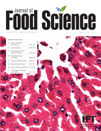
JOURNAL OF FOOD SCIENCE
Transforming Discoveries into Practical SolutionsJOURNAL OF FOOD SCIENCE, published by Wiley, is a premier journal dedicated to advancing the field of food science, bridging the gap between fundamental research and practical application. With an impressive impact factor reflecting its authoritative status, the journal is ranked in the Q1 quartile for Food Science in 2023 and boasts a Scopus ranking of #71 out of 389, placing it in the 81st percentile within Agricultural and Biological Sciences. First launched in 1936, the journal continues to serve as an essential platform for researchers, professionals, and students to disseminate innovative studies and reviews that address critical issues in food quality, safety, and technology. While not currently offering open access, its rigorous peer-review process ensures the dissemination of high-quality and impactful research. Researchers engaged in the vital disciplines of food science will find this journal indispensable for keeping abreast of cutting-edge developments in the field.

Italian Journal of Animal Science
Pioneering research for a sustainable future in animal care.Italian Journal of Animal Science (ISSN: 1594-4077; E-ISSN: 1828-051X), published by Taylor & Francis Ltd, serves as a pivotal platform for the dissemination of cutting-edge research in the fields of animal science and zoology. Since its transition to Open Access in 2002, it has broadened its reach, allowing researchers from around the globe to share their findings and engage in critical dialogue. With its esteemed Q1 ranking in the 2023 category of Animal Science and Zoology and a notable position in the Scopus rankings—ranked 65 out of 490—this journal is a leader in driving the advancement of knowledge in animal science. The Italian Journal of Animal Science aims to publish original research articles, reviews, and methodological papers that contribute to the understanding of animal biology, welfare, nutrition, and conservation, making it a vital resource for researchers, professionals, and students dedicated to advancing the field. Based in the United Kingdom, and with a commitment to excellence, the journal is poised to continue fostering scholarly communication through 2024 and beyond.
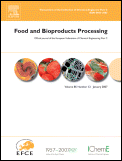
FOOD AND BIOPRODUCTS PROCESSING
Fueling the future of biochemistry and biotechnology in the food industry.FOOD AND BIOPRODUCTS PROCESSING, published by Elsevier, is a leading journal dedicated to advancing the fields of biochemistry, biotechnology, chemical engineering, and food science. With a strong impact factor and robust rankings—Q2 in Biochemistry and Biotechnology, and Q1 in Food Science—it serves as an essential resource for researchers, industry professionals, and students alike. The journal focuses on innovative research and practical applications in the processing of food and bioproducts, spanning from raw material transformation to product development. By fostering the exchange of knowledge and ideas, FOOD AND BIOPRODUCTS PROCESSING aims to enhance food quality and sustainability while addressing global challenges in food security and environmental impact. With an accessible format and a diverse pool of contributors, this publication stands as a vital platform for groundbreaking studies, making significant contributions to the advancement of technology and practices in food processing and production.
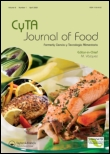
CyTA-Journal of Food
Innovating food technology through cutting-edge research.CyTA-Journal of Food is a prestigious academic journal published by TAYLOR & FRANCIS LTD, dedicated to advancing the field of food science and technology through the dissemination of innovative research and practical knowledge. With an ISSN of 1947-6337 and an E-ISSN of 1947-6345, this journal stands out with its strong impact factor and is currently placed in the Q2 quartile across multiple categories, including Chemical Engineering, Chemistry, and Food Science, making it a vital resource for researchers and professionals alike. The journal has been an integral part of the academic community since its inception in 2009, and continues to publish cutting-edge articles through to 2024. Its alignment with Scopus ranks further signifies its influence, notably achieving 67th percentile in Industrial and Manufacturing Engineering. As an Open Access journal, it ensures widespread accessibility to its valuable content, promoting collaboration and knowledge sharing among scientists, engineers, and students dedicated to enhancing food safety, quality, and sustainability.